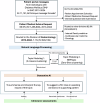Artificial intelligence tools in supporting healthcare professionals for tailored patient care
- PMID: 40240489
- PMCID: PMC12003912
- DOI: 10.1038/s41746-025-01604-3
Artificial intelligence tools in supporting healthcare professionals for tailored patient care
Abstract
Artificial intelligence (AI) tools to support clinicians in providing patient-centered care can contribute to patient empowerment and care efficiency. We aimed to draft potential AI tools for tailored patient support corresponding to patients' needs and assess clinicians' perceptions about the usefulness of those AI tools. To define patients' issues, we analyzed 528,199 patient messages of 11,123 patients with diabetes by harnessing natural language processing and AI. Applying multiple prompt-engineering techniques, we drafted a series of AI tools, and five endocrinologists evaluated them for perceived usefulness and risk. Patient education and administrative support for timely and streamlined interaction were perceived as highly useful, yet deeper integration of AI tools into patient data was perceived as risky. This study proposes assorted AI applications as clinical assistance tailored to patients' needs substantiated by clinicians' evaluations. Findings could offer essential ramifications for developing potential AI tools for precision patient care for diabetes and beyond.
© 2025. The Author(s).
Conflict of interest statement
Competing interests: In the last 3 years, CIR has served as a consultant for Biohaven Pharmaceuticals, Osmind, and Biogen; and receives research grant support from Biohaven Pharmaceuticals, a stipend from American Psychiatric Association Publishing for her role as Deputy Editor at The American Journal of Psychiatry, and book royalties from American Psychiatric Association Publishing. The other authors declare no competing interests.
Figures


 Scheduling/canceling,
Scheduling/canceling,  Pharmacy/refill,
Pharmacy/refill,  Medication,
Medication,  Symptom (Pain/fell),
Symptom (Pain/fell),  Thyroid/hormone,
Thyroid/hormone,  Lab/test order,
Lab/test order,  Treatment/surgery,
Treatment/surgery,  Mental Health/sleep,
Mental Health/sleep,  Insurance/coverage,
Insurance/coverage,  Device/Sensor/supplies,
Device/Sensor/supplies,  Meal/diet.
Meal/diet.
References
-
- Lancet, T. Diabetes: a defining disease of the 21st century. Lancet401, 2087 (2023). - PubMed
-
- Harding, J. L., Pavkov, M. E., Magliano, D. J., Shaw, J. E. & Gregg, E. W. Global trends in diabetes complications: a review of current evidence. Diabetologia62, 3–16 (2019). - PubMed
-
- Rustad, J. K., Musselman, D. L. & Nemeroff, C. B. The relationship of depression and diabetes: pathophysiological and treatment implications. Psychoneuroendocrinology36, 1276–1286 (2011). - PubMed
-
- Khaledi, M., Haghighatdoost, F., Feizi, A. & Aminorroaya, A. The prevalence of comorbid depression in patients with type 2 diabetes: an updated systematic review and meta-analysis on huge number of observational studies. Acta Diabetol.56, 631–650 (2019). - PubMed
-
- Dal Canto, E. et al. Diabetes as a cardiovascular risk factor: an overview of global trends of macro and micro vascular complications. Eur. J. Prev. Cardiol.26, 25–32 (2019). - PubMed
Grants and funding
LinkOut - more resources
Full Text Sources

